JD Edwards provides two main types of Financial Integrity reports, Batch Header reports and General Ledger reports. The Batch Header reports locate problems in the batches and the corresponding detail. The General Ledger (G/L) reports reviews transactions within a Company, Intercompany Settlement, or ; and compares the Account Master F0901 to the Business Unit (BU) Master F0006, Account Balances F0902, and the Account Ledger F0911.
You can also utilize five subsidiary integrity reports; Accounts Payable, Fixed Assets, Accounts Receivable, Inventory and Payroll. These reports compare each subsystem to the General Ledger and will be covered in subsequent blogs in this series.
In addition to integrity reports, beginning with EnterpriseOne (E1) 9.2, some financial integrities can be run in real time to fix issues.
General Ledger Integrity Reports
Companies in Balance (G0922, R097001)
This is the primary report that identifies an out-of-balance condition exists. It compares all postings . Amount should balance to zero. Out-of-balance conditions will be shown for current year, prior year, and future periods.
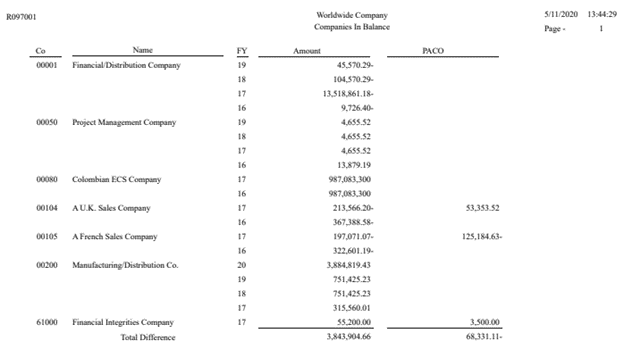
This is the primary report that identifies an out of balance condition exists.
Intercompany Accounts in Balance (G0922, R097011)
This report balances the machine generated intercompany accounts with one another. All these accounts, system wide, should net to zero. The report verifies the intercompany settlement accounts are in balance.
Note: The report does not work with the Intercompany Settlements. It only works with the method).

Intercompany Accounts in Balance – Interactive (G09221, P097001)
This is the interactive application that identifies an out-of-balance condition exists. It compares all postings . Amount should balance to zero. Out-of-balance conditions will be shown for current year, prior year, and future periods.
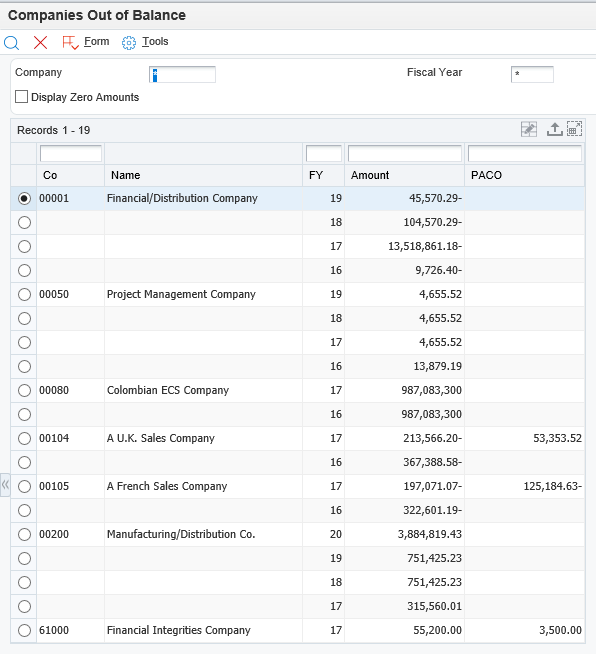
Accounts Without Business Units (G0922, R097041)
Lists records (Accounts) in the F0901 file with Business Unit and Company discrepancies. Also, it can update the F0901 from the F0006 BU Master.
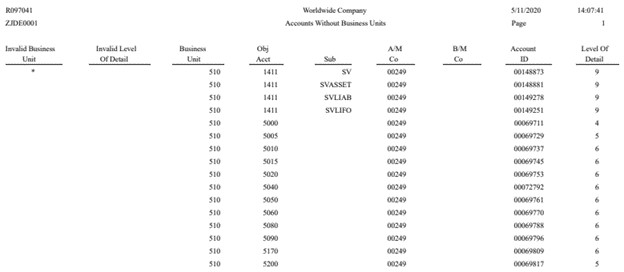
Accounts Without Business Units – Interactive (G09221, P097041)
This is the interactive version of the R097041 described above and it lists records (Accounts) in the F0901 file with Business Unit and Company discrepancies. Also, it can update the F0901 from the F0006 BU Master.
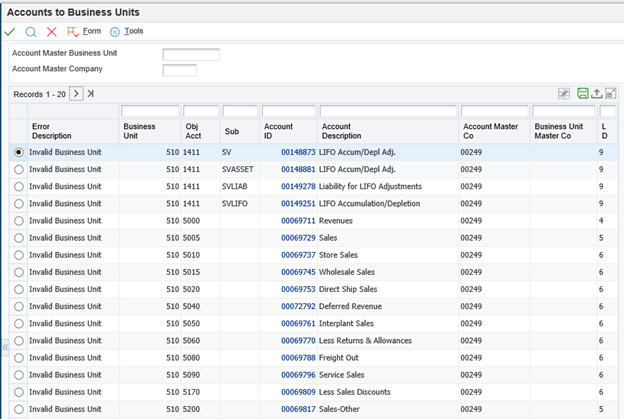
Account Balance Without Account Master (G0922, R097031)
Compares Object Accounts in the F0901 file to the Balances in the F0902 file.

Account Balance Without Account Master – Interactive (G09221, P097031)
This is the interactive application of the R097031 and compares Object Accounts in the F0901 file to the Balances in the F0902 file.

Transactions Without Account Master (G0922, R097021)
Compares Object Accounts in the F0901 file to the Transactions in the F0911 file.
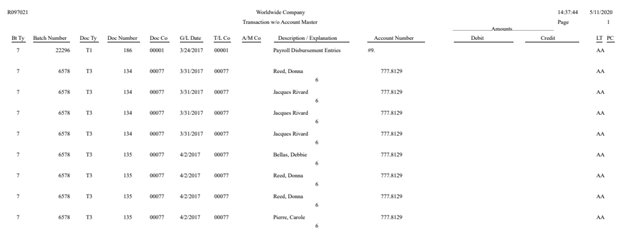
Transactions Without Account Master – Interactive (G09221, P097021)
This is the interactive application of the R097021 and compares Object Accounts in the F0901 file to the Transactions in the F0911 file.

Account Balance to Transactions (G0922, R09705)
Compares Detail Transactions in the F0911 file to the Account Balance in the F0902 file on a period-by-period basis.
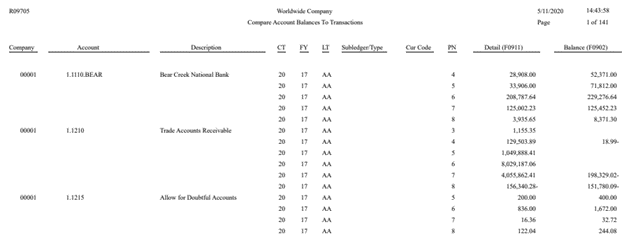
Global Update BU/OBJ/SUB to F0902/F0911 from F0901 (G09316, R09806)
In the Chart of Accounts, this report updates obsolete values (Business Unit, Object Account and Subsidiary) in the Account Balances and Account Ledger tables to the current values.
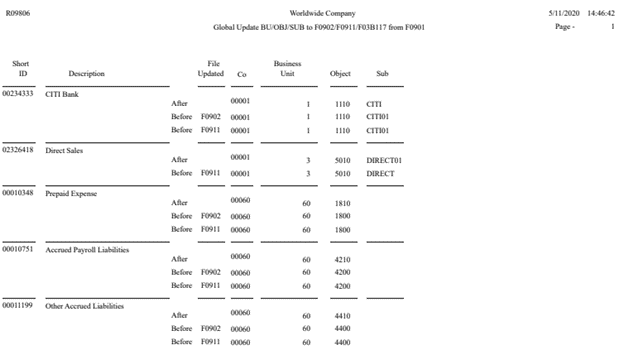
Financial Integrity Work-Table Purge (G09316, R007013)
Use the Financial Integrity Worktable Purge to purge records from all the worktables in the interactive integrity programs.
These worktables include: Transactions to Batch Headers (F007021W), Batches Out of Balance (F007032W), Batch and Company Within Batch Out of Balance (F09706W), Companies Out of Balance (F097001W), Accounts to Business Units (F097041W); Account Balance to Account Master (F097031W); Account Ledger to Account Master (F097021W). (Note: no longer used in 9.2 or above).
Batch Header Integrity Reports
Unposted Batches (G0922, R007011)
Displays all un-posted batches as “non-posted” regardless of the reason.
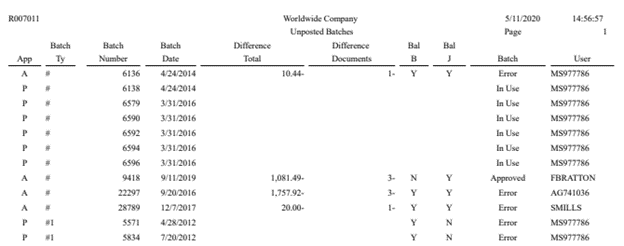
Company by Batch Out of Balance (G0922, R09706)
Displays all out of balance issues for each company within each batch.

Company by Batch Out of Balance – Interactive (G09221, P09706)
This is the interactive version of the R09706. It displays all out of balance issues for each company within each batch. This is normally used as part of an issue follow-up, this report provides details once an out of balance condition is identified.
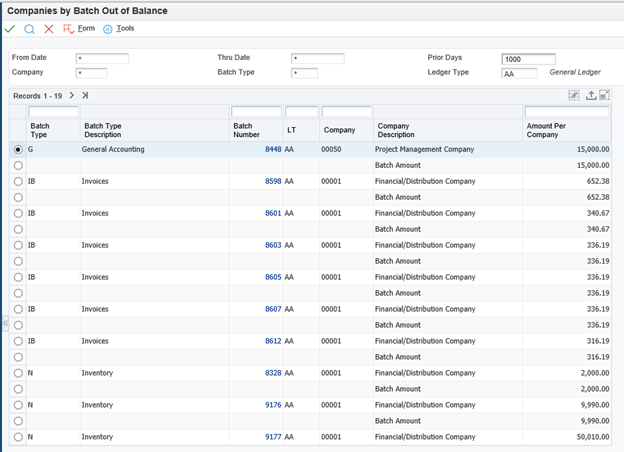
Transactions to Batch Headers (G0922, R007021)
This report compares the F0011 Batch Header file to the F0413 Batch Header Records file. It also shows transaction records without a batch header record and unposted transactions with a batch status of “D” (posted).
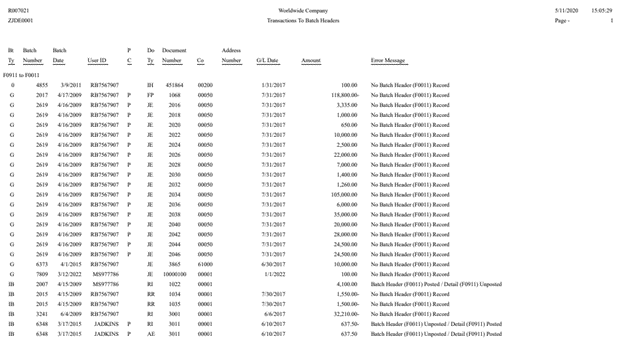
Transactions to Batch Header – Interactive (G09221, P0072131)
Use the Transactions to Batch Headers program to identify discrepancies between batch records in the F0011 table and its associated transactions in the F0911, F03B11, F03B13, F03B14, F0411, F0413, and F0414 tables. The Transactions to Batch Headers program displays a record count of the number of transaction detail records that have a status difference from the header record. You can review the transaction details by selecting a record to navigate to the applicable program.
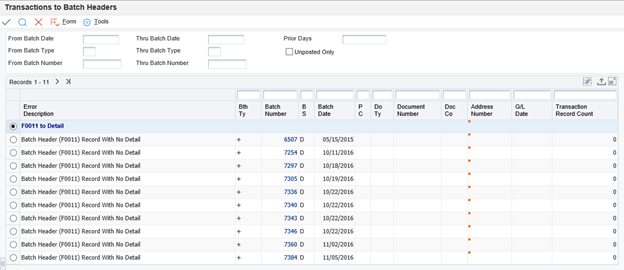
Batch to Detail & Out of Balance (G0922, R007031)
This report displays all posted batches that are Out of Balance. It also has the update capability to delete batch header records with no detail records or update the batch status to “D” (posted) if the detail records all show posted.
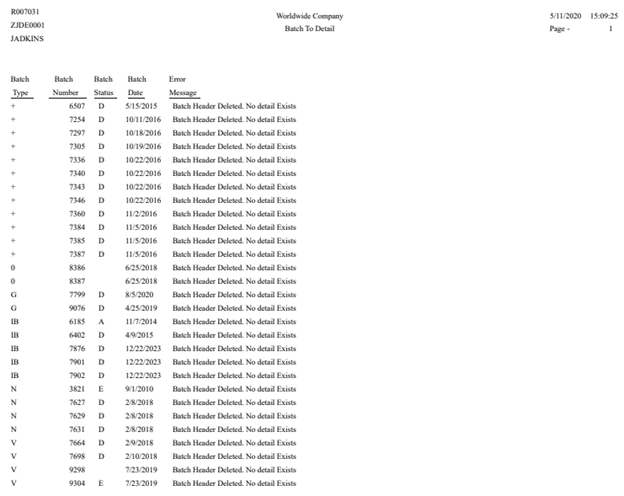
Normally a follow up, details report once an out of balance condition exists.
Batch Out of Balance (R007032)
This report allows the user to review batches in which the net amount is not zero.
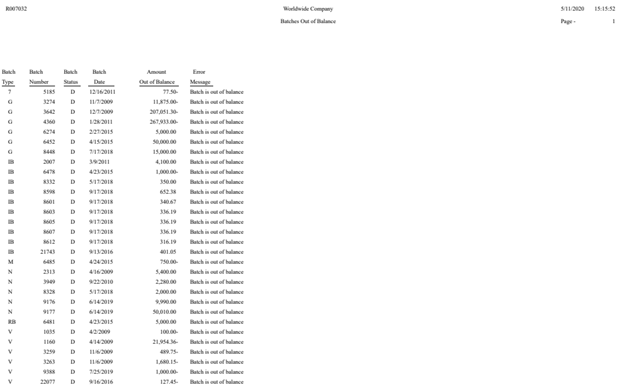
Batch Out of Balance – Interactive (G09221, P007032)
This is the interactive version of R007032. This application allows the user to review batches in which the net amount is not zero.
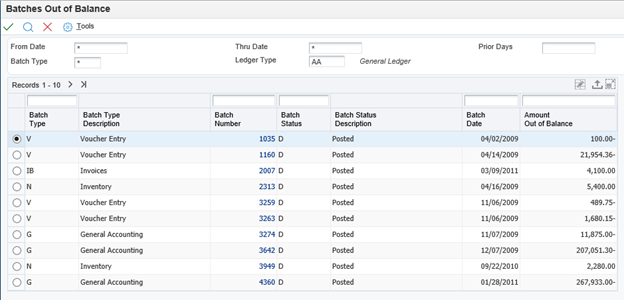
Additionally, the watch list functionality works with each of the interactive applications, listed above, to receive real time notice of any new issues identified.
Typical Causes of JD Edwards Integrity Issues
There are many reasons why integrity issues can arise within JD Edwards. See below for some of the most common:
- Power outages or interruptions – causing a temporary stoppage of the process.
- User interventions / job cancellations / errors – a user starts the process and then cancels it, causing errors.
- System failures – time outs, program failures, etc. which are causing errors.
- Out-of-Balance batches – a batch was posted out-of-balance in error (the batch override setting was changed to allow the batch to post out-of-balance).
- Partial postings – a batch of journal entries is partially posted due to a computer failure or power failure.
- Incorrect company numbers – the company was changed on a business unit record but the relevant tables were not updated.
- Missing Batch headers – transaction entries do not have batch headers and the batch cannot be posted.
- Invalid accounts – an unposted batch contains an invalid account and the batch cannot be posted.
- Incorrect editing codes – a manual journal entry was entered to an intercompany account (intercompany accounts should be assigned a posting edit code “M” to allow machine generated entries only (doc type AE)).
- Single-threaded job queues – ensure that you post transactions using a single-threaded job queue (it can cause issues if multiple applications access a record simultaneously).
Recommended Integrity Report Run Schedule from JD Edwards
Below is the integrity report order and cadence per the current JD Edwards recommendations.
- Companies in Balance (R097001) – Weekly during each month (minimum) and nightly during the 1st through the 6th business day (close)
- Intercompany Accounts in balance (R097011) – Twice monthly, 15th and end of the month
- Accounts without Business Units (R097041) – Twice monthly, 15th and end of the month
- Account Balance without Account Master (R097031) – Twice monthly, 15th and end of the month
- Transactions without Account Master (R097021) – Twice monthly, 15th and end of the month
- Account Balance to Transactions (R09705) – Twice monthly, 15th and end of the month
- Unposted Batches (R007011) – Monthly for batches over 45 days old
- Transactions to Batch Headers (R007021) – As needed to investigate out of balance issues
- Batch to Detail & Out of Balance (R007031) – As needed to investigate out of balance issues
- Batch Out of Balance (R007032) – As needed to investigate out of balance issues
- Company by Batch Out of Balance (R09706) – As needed to investigate out of balance issues
Preferred Order to Run Integrity Reports
After over 20 years of experience managing JD Edwards financial systems and helping clients to manage their JD Edwards financial systems, I recommend running the integrity reports in the following order. This order has proven invaluable in ensuring issues were identified and resolved quickly and completely.
- Transactions to Batch Headers (R007021)
- Batch to Detail & Out of Balance (R007031)
- Unposted Batches (R007011)
- Companies in Balance (R097001)
- Company by Batch Out of Balance (R09706)
- Batches Out of Balance (R007032)
- Intercompany Accounts in Balance (R097011)
- Account Balance to Transactions (R09705)
- Repost Account Ledger (R099102)
- Accounts without Business Units (R097041)
- Account Balance without Account Master (R097031)
- Transactions without Account Master (R097021)
- Foreign Account Balances (R09707)
Conclusion
There are two things that need to happen during the month to ensure your files in the general ledger and subledger systems are in balance. The first is to make sure all general ledger transaction files are posted, both in the GL and the subsystem. The second is to make sure that the companies within the trial balance file are balanced. It is recommended to run JD Edwards integrity reports or interactive applications throughout the month to catch any errors before month end, giving you more time to analyze errors and determine the required corrections.
If you have the financials set up correctly, the general ledger file and trial balance should stay in sync and in balance, allowing you to complete efficient, error-free month end closes.

